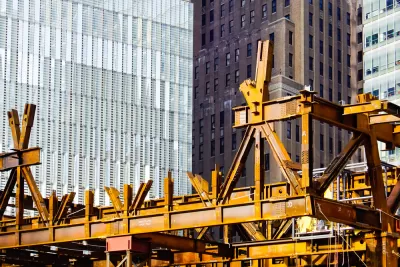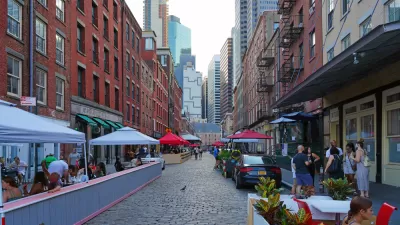Planning and building the future will have to wait.

From a March 16, 2020 press release on the New York City Department of City Planning website:
“To avoid the need to hold public gatherings and minimize the potential spread of COVID-19, Mayor Bill de Blasio has temporarily suspended New York City’s land use decision making processes. The suspension of the City's official public review process, the Uniform Land Use Review Procedure (ULURP), was made via Executive Order.
As of the issuance of this Executive Order, all City Planning Commission meetings, including public hearings and votes required as part of land use review processes, are suspended and the time periods for hearings and votes will not run.”
The press release only promises an announcement of when the land use review process will resume in the city, but does not offer a projected timeline.
Meanwhile in Boston on the same day, Tim Logan reports that Mayor Marty J. Walsh "ordered a stop to all construction projects in the city, citing concerns about worker safety and a need to blunt the spread of the highly contagious virus." The move brings the city's ongoing building boom to a halt, according to Logan.
"The move will bring billions of dollars of construction work to an abrupt halt, leaving the prospect of half-finished office towers and apartment buildings all over town, at least for the time being," writes Logan. Still unclear: where the economic pain of the shutdown will be felt most acutely: "A web of investors, developers, large general contractors, and smaller subcontractors all have money on the line in a major project, and often promise firm delivery dates to potential tenants. The longer the shutdown, the more those costs will grow."
FULL STORY: Statement from Department of City Planning Director and City Planning Commission Chair Marisa Lago

Study: Maui’s Plan to Convert Vacation Rentals to Long-Term Housing Could Cause Nearly $1 Billion Economic Loss
The plan would reduce visitor accommodation by 25,% resulting in 1,900 jobs lost.

Alabama: Trump Terminates Settlements for Black Communities Harmed By Raw Sewage
Trump deemed the landmark civil rights agreement “illegal DEI and environmental justice policy.”

Why Should We Subsidize Public Transportation?
Many public transit agencies face financial stress due to rising costs, declining fare revenue, and declining subsidies. Transit advocates must provide a strong business case for increasing public transit funding.

Paris Bike Boom Leads to Steep Drop in Air Pollution
The French city’s air quality has improved dramatically in the past 20 years, coinciding with a growth in cycling.

Why Housing Costs More to Build in California Than in Texas
Hard costs like labor and materials combined with ‘soft’ costs such as permitting make building in the San Francisco Bay Area almost three times as costly as in Texas cities.

San Diego County Sees a Rise in Urban Coyotes
San Diego County experiences a rise in urban coyotes, as sightings become prevalent throughout its urban neighbourhoods and surrounding areas.
Urban Design for Planners 1: Software Tools
This six-course series explores essential urban design concepts using open source software and equips planners with the tools they need to participate fully in the urban design process.
Planning for Universal Design
Learn the tools for implementing Universal Design in planning regulations.
Smith Gee Studio
Alamo Area Metropolitan Planning Organization
City of Santa Clarita
Institute for Housing and Urban Development Studies (IHS)
City of Grandview
Harvard GSD Executive Education
Toledo-Lucas County Plan Commissions
Salt Lake City
NYU Wagner Graduate School of Public Service





























